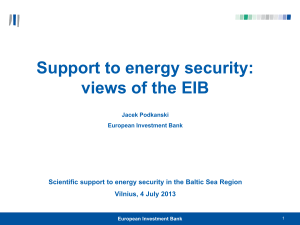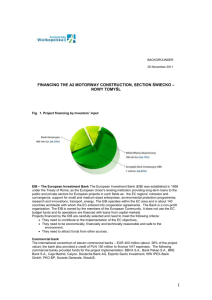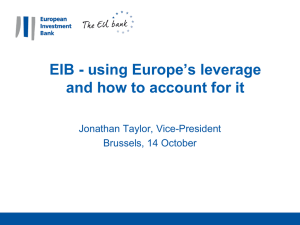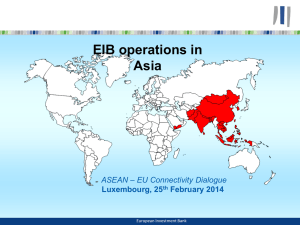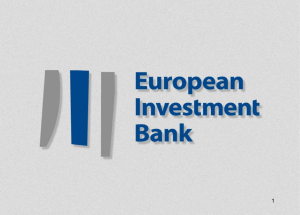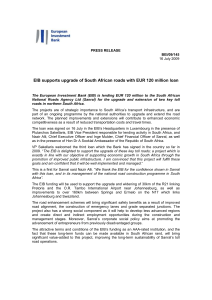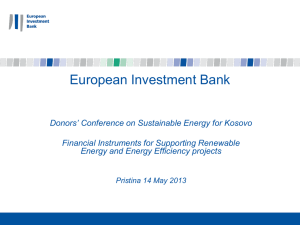Lending strategy outside the EU
advertisement
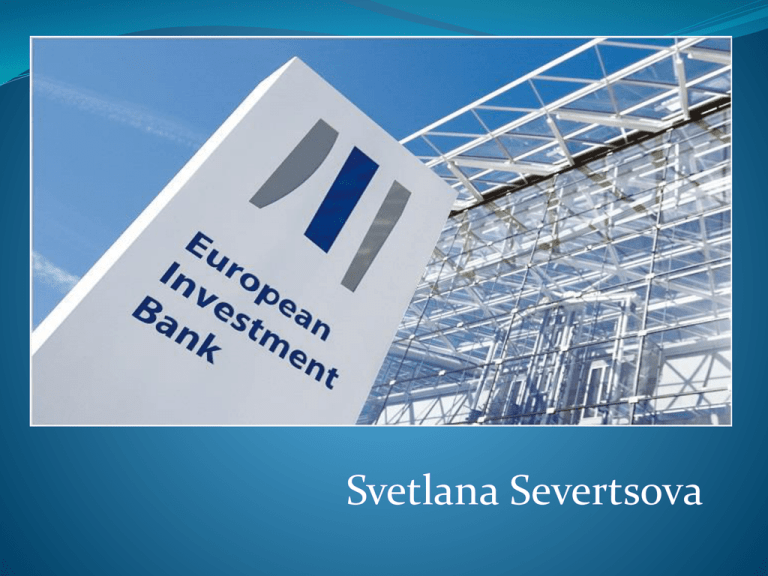
Svetlana Severtsova What is the European Investment Bank? The European Investment Bank is the European Union's nonprofit long-term lending institution established in 1958 under the Treaty of Rome 1957. As a "policydriven bank" whose shareholders are the member states of the EU, the EIB uses its financing operations to bring about "European integration and social cohesion". The EIB is an international financial institution, a publicly owned bank. Its owners are the member states of the European Union, who subscribe to the Bank's capital – EUR 232 billion. As shareholders the member states are represented on the Bank's main independent decision-making bodies – the Board of Governors and the Board of Directors History 1958 - The European Investment Bank was founded in Brussels . When it was founded in 1958 it had just 66 employees. 1968 - It relocated to Luxembourg, its current headquarters. 1999 - it counted over 1,000 staff members, a figure that has nearly doubled by 2012; when the EIB was founded in 1958 it had 66 employees. June 2000 - the Bank became a part of the newly formed EIB Group, which includes both the EIB and the European Investment Fund (EIF), the venture capital arm of the EU that provides finances and guarantees for small and medium enterprises , of which it is the majority shareholder, with 62% of the shares. The total subscribed capital of the Bank is EUR 232 billion, of which EUR 11.6 billion were actually paid-in. The capital of the EIB was virtually doubled between 2007 and 2009 in response to the crisis. The EU heads of government agreed to increase paid-in capital by EUR 10 billion in June 2012, with approval due for the end of the year. For the fiscal year 2011, EIB lent EUR 61 billion in various loan products, bringing total outstanding loans to EUR 395 billion; one-third higher than at the end of 2008. Nearly 90% of these were with EU member states with the remainder dispersed between around 150 "partner countries" (in Southern and Eastern Europe, the Mediterranean region, Africa, Asia, Latin America, the Caribbean and the Pacific). Strategy of EIB Lending strategy within the EU. Within the EU the EIB has six priority objectives: Cohesion and convergence (regional policy) Support for small and medium-sized enterprises (SMEs) Environmental sustainability Knowledge economy Development of Trans-European Networks of transport and energy (TENs) Sustainable, competitive, and secure energy Lending strategy outside the EU Outside the EU the EIB's priority objectives for lending activity are: Private sector development financial sector development Infrastructure development Security of energy supply Environmental sustainability EU presence Governance The EIB is governed by the: Board of Governors – usually the Finance Ministers of the Member States. Their mandate is to authorize EIB activities outside the Union, form credit policy guidelines and approve the annual account. Board of Directors – 28 members (one nominated by each member state and one by the European Commission). Management Committee – the President of the EIB and 8 Vice Presidents Audit Committee – 6 members appointed by the Board of Governors Lending priorities of EIB 30% of the Bank’s yearly financing goes to investments that mitigate greenhouse gas emissions and improve adaptation to climate change impacts. These are mainly in the energy, transport, water, wastewater, solid waste, forestry and research, development and innovation sectors. Current projects of EIB France’s “Viaduc de Millau” , Automotive R&D in Germany, Scandinavia’s Oresund bridge, The Athens metro, Solar energy in Spain, The clean-up of the Baltic Sea It is a few of the thousands of projects financed by the EIB over the years. The Bank operates also in the African, Caribbean and Pacific countries and Asia and Latin America. Its financing activities are aimed at supporting local private sector development, improving social and economic infrastructure mitigation and adaptation. and climate change The EIB offers a wide range of financial products at favorable interest rates. For certain investments, the EIB is ready to accept more credit risk than a commercial bank if this increases value added in support of EU policies. The Bank also offers technical assistance to support project preparation and implementation, particularly in countries that recently joined the European Union or countries outside the EU. Clients of EIB Borrowers are public sector bodies and private enterprises. Projects over EUR 25 million are financed with direct loans. Small and medium-scale ventures and smaller infrastructure projects are financed through credit lines in cooperation with national and regional intermediary banks (intermediated loans). The EIB does not lend more than 50% of the funds required for implementing a project. The EIB works closely with other international financing institutions, the European Commission and commercial banks. EIB`s recourses The EIB is financially autonomous and raises the bulk of its lending resources on the international capital markets through bond issues. It has capital of EUR 232 billion, subscribed by the 27 EU Member States. The Bank is one of the largest borrowers on the public international market. Its excellent credit rating allows it to borrow at the best possible rates. The benefits are transferred to project promoters, which pay only a small mark-up to cover the EIB’s costs and, if applicable, a risk margin. What are the EIB`s lending priorities? Who are the EIB`s clients? Where do EIB resources come from?
